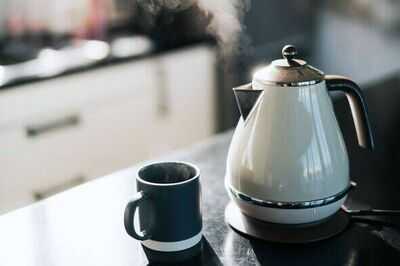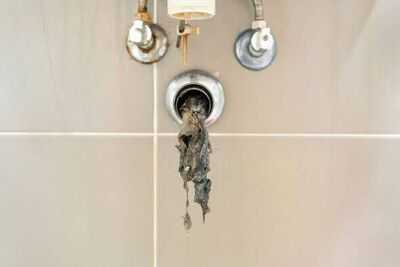As the weather turns cooler and the leaves start to fall, autumn brings its own set of home maintenance challenges - and one of the most common is a blocked drain or sink. While it's easy to blame outdoor leaves for clogging gutters, indoor drains often suffer this season too.
Grease from autumn cooking, coffee grounds, and bits of food can build up in the kitchen sink, while hair and soap scum can thicken faster in bathroom drains as we take more hot showers. The result? Slow draining water, unpleasant smells, and sometimes a complete blockage just when you need your plumbing to work its hardest. To discover what genuinely delivers results, we consulted seven plumbing and bathroom specialists for their preferred techniques to unblock drains.

And whilst they provided numerous different tricks, one thing was evident: they all suggest beginning with the identical straightforward method - boiling water.
1. Boiling waterEvery specialist concurred: before you grab chemicals or elaborate gadgets, commence with boiling water.
Pouring boiling water down drains is a straightforward yet powerful trick, explains Andy Ellis, shower and bathroom specialist at Vidalux: "It can help fix drain clogs by melting and loosening any grease or scum that is in the pipes."
Olivia Young, cleaning specialist at Astonish, offers the identical guidance: "Start by pouring a kettle of boiling water down the drain to loosen residue."
And Jess Thomas, managing director of Drainage Central, advocates doing it in phases: "Fill your kettle with the maximum amount of water that it can hold and boil it.
"Slowly pour the water down the blocked drain in two to three stages, allowing a few seconds between each stage to give the water time to work. This can be repeated if needed, and adding washing-up liquid can help if you think that the blockage is caused by grease."
A specialist at Plumbworld concurred: "One of the simplest cleaning hacks is to regularly pour boiling water down the drain to help dissolve grease."
2. Baking soda and vinegarSix out of seven experts also advocate for the fizzing combination of baking soda (or bicarbonate) and white vinegar.
"Using a solution of baking soda, vinegar, and water can easily unblock a bathroom sink," says James Roberts, director of Sanctuary Bathrooms. "Vinegar's acidic nature enables it to dissolve dirt, grease, grime, and eliminate bacteria, making it an ideal cleaner for your bathroom."
Andy from Vidalux agrees: "My go-to hack is to pop in about four tablespoons of bicarbonate of soda, pour over roughly 250ml of white vinegar, let it fizz for five to 10 minutes, then flush it through with more boiling water."
Olivia from Astonish recommends the same method: "Add half a cup of bicarbonate of soda, followed by half a cup of white vinegar, and let it fizz for around 10 minutes before flushing with more boiling water."
Even Plumbworld stands by it: "For more stubborn blockages, a natural mixture of baking soda followed by white vinegar can create a fizzing action that loosens debris."
However, Jess from Drainage Central begs to differ. She contends: "Leaving the two to sit in a drain for too long can cause them to harden and add to the blockage, and the acidity of vinegar may corrode older, metal pipes."
Yet, with six out of seven backing it, this is evidently the plumbers' top home remedy.
3. PreventionSeveral experts emphasised that prevention is as crucial as unblocking.
"The trick is to keep on top of them before they get bad," advises Andy (Vidalux). "Once a month, pull out any hair or gunk you can see, then pour boiling water down to clear things through."
Olivia (Astonish) advocates for drain covers in the bathroom: "A simple drain cover can catch hair before it causes problems."
Plumbworld recommends strainers in the kitchen: "Regular use of drain strainers is also a great preventive measure to stop hair and food particles entering the pipes."
4. ToolsIf boiling water and baking soda don't do the trick, manual methods might be your best option.
Aspect's drainage engineer suggests a drain snake: "Carefully extract any obstructions you find using a drain snake, but be careful, as using too much pressure with a drain snake can cause damage to plastic pipes."
Plumbworld adds: "If you need a tool, a manual drain snake or a plunger designed for sinks can help physically remove clogs without harsh chemicals."
Jess from Drainage Central offers a budget DIY tip: "You can use a wire coat hanger to make a homemade drain snake to attempt to fish out the blockage or dislodge it. Bend the wire of the hanger into a hook, and insert this into the drain to remove clogs."
 5. Be wary of chemical cleaners
5. Be wary of chemical cleaners While some people reach straight for a bottle of caustic soda, the experts are cautious.
Aspect's drainage engineer gives a stark warning: "Caustic soda or 'lye' (sodium hydroxide) is a type of corrosive unblocker that can eat away at uPVC pipes when used excessively. Unless the crystals fully dissolve and clear the blockage right away, they can harden like cement - creating an additional blockage. You may then need to replace the pipe entirely."
Plumbworld recommends avoiding harsh chemicals altogether: "Enzyme-based drain cleaners like Bio-Clean or Green Gobbler break down organic matter safely without damaging your pipes. Avoid chemical-heavy cleaners where possible to protect your plumbing and the environment."
Jess from Drainage Central agrees bleach should be a last resort: "Bleach should be used as a last resort, as it can corrode some pipes."
6. Other hacks to unblock drainsA few experts suggested alternative home remedies worth a try:
Salt and lemon juice - Salt can act as a mild abrasive, while lemon juice adds acidity and freshness.
Effervescent tablets - Fizzy indigestion tablets dropped into a drain with vinegar can mimic the bubbling action of baking soda and vinegar.
Washing powder - Biological washing powder to break down fat and oil, followed by boiling water.
Vodka or Coca-Cola - Vodka can help with maintenance (to kill bacteria and odours), while Coca-Cola can dislodge dirt if you've got nothing else to hand.
You may also like

Gitex Global 2025: World's largest 5 day tech and AI event wraps up successfully in Dubai

'Nuclearised environment': Pakistan army chief Asim Munir at it again; makes unprovoked remark at Indian military

Experts Share Simple Ways to Stay Healthy at Home Amid Rising Air Pollution

Doctor Shares Essential Tips to Protect Newborns from Diwali Pollution and Noise

MP CM Yadav hails agriculture reforms, to cover 100 lakh hectare irrigation acreage by 2028-29






